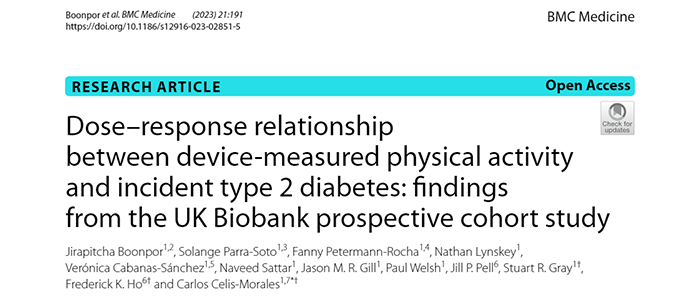New Publication Released in BMC Medicine
Published: 25 May 2023
Dose–response relationship between device‑measured physical activity and incident type 2 diabetes: findings from the UK Biobank prospective cohort study
Dose–response relationship between device‑measured physical activity and incident type 2 diabetes: findings from the UK Biobank prospective cohort study
Jirapitcha Boonpor, Solange Parra‑Soto, Fanny Petermann‑Rocha, Nathan Lynskey, Verónica Cabanas‑Sánchez, Naveed Sattar, Jason M. R. Gill, Paul Welsh, Jill P. Pell, Stuart R. Gray, Frederick K. Ho and Carlos Celis‑Morales

About
A new study published in BMC Medicine led by Carlos Celis and colleagues from the School of Cardiovascular and Metabolic Health and School of Health and Wellbeing provides evidence that all forms of objectively measured PA are associated with lower type 2 diabetes risk in a dose-response relationship. This study included 40,431 participants from the UK Biobank who were measured with accelerometers.
Individuals who meet the physical activity recommendations of 150 minutes/week of moderate-equivalent physical activity have a 49% lower risk of developing type 2 diabetes. Interestingly, only 20% of the association between physical activity and type 2 diabetes risk is mediated by adiposity.
Our findings broadly support current PA guidelines and suggest they could be even more ambitious. Public health policy aiming to increase PA at population levels is important as an adjunct to dietary-induced weight-loss strategies to prevent type 2 diabetes.
First published: 25 May 2023

